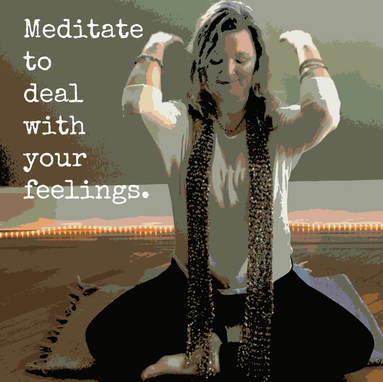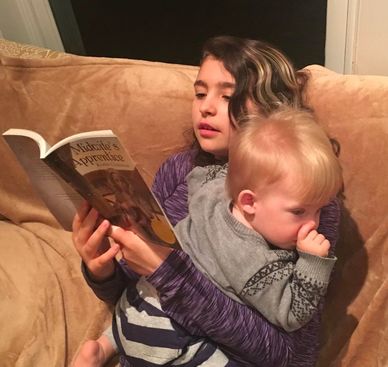 I know my way around a baby. I've been taking care of babies since I was a teenager. But a few weeks ago, I had a humbling experience that taught me not only about babies but about all of us and our feelings. My daughter (Gwen) and I were babysitting my 18-month-old nephew, Remy. When my sister left, he began to cry and call out for "Mommy." This wasn't surprising. It was to be expected. I knew what to do. I sprung into distraction mode. Get his mind on anything except the fact that his mommy isn't here. I grabbed books and toys off the shelf: "Look at this truck." "Want me to read about the caterpillar?" "Here's your doggie." He cried harder and louder. Gwen looked at me like I was crazy and said, "Mom, stop." She scooped Remy up and carried him to the rocking chair. She looked him straight in the eyes as she rocked and with so much compassion, she said, "You miss your mommy; You're really sad; You want your mommy to come back." As she sweetly said these words, he looked right back at her, and his wails became whimpers. She kept saying them over and over, as I watched in awe. Remy put his thumb in his mouth and stayed focused on her, "You really, really want your mommy to come back right now." Then, his eyelids got heavy and moments later he fell asleep in her arms. Later, I asked Gwen how she knew to do that. She explained that she put herself in Remy's shoes. If it were her, she'd be so frustrated trying to tell people she's sad and she misses her mommy and people are showing her trucks. Isn't my daughter amazing? Isn't that insightful? What Remy needed was not a stuffed doggie but his feelings acknowledged. Once validated, the acuteness of his feelings began to dissolve.  Another cuddly moment with Gwen & Remy Another cuddly moment with Gwen & Remy It got me thinking that we all need that. The problem is that when something makes us sad or mad or overwhelmed or confused, we can't, as adults, cry out and have someone validate us and rock us to sleep. I mean, it could happen. But let's face it, it's unlikely. So what do we do? How do we acknowledge our pain and move beyond it? As I see it, we meditate. We get quiet and allow the feelings and painful thoughts that we don’t talk about, that we can’t talk about, to rise up. Then we “deal” with them by shifting our consciousness. By bringing our focus to a particular breath, by placing our bodies in a particular position, by weaving a mantra through our whole selves, we change the sharpness of the pain. We change the suffering. You know how there are baby whisperers, horse whisperers, dog whisperers — people who can “speak” to creatures who can’t speak for themselves? We need to be our own whisperers, allow our unspoken pain to surface and then soften. A state of meditation is being your own whisperer. May the Truth in you guide you.  "Let's get pedicures!" my daughter said. My first thoughts were all the reasons why not: I have too much to do. It's too expensive. It's winter, and we can't wear flip flops. Pedicures are frivolous and unnecessary. Then, I internally argued the reasons why it was a good idea. I believe in following my children's whims sometimes. One of the best ways to connect with them is to go with their flow. (This used to mean playing pretend games, especially what we called the Irrational Baby Game, in which I acted like a tantruming infant while my children acted as adults trying calm me down. They loved that one.) What chore or email was really so important that I couldn't stop and step away to be in the moment with my girl? I weighed both sides. Everything on both sides was true, but what was the higher good? It's clear from my photo what I decided, and it was a happy choice that I think about every time I look down at my blue toes. (Guess who chose my color?) This little moment of decision-making illustrates one of Yogi Bhajan's most relatable teachings: He said that we have three functional minds: the Negative Mind, the Positive Mind, and the Neutral Mind. The Negative Mind is NO! DON'T! It protects us from danger and helps us sustain life: It says: don't touch the hot stove; refrain from jumping out of a moving car; hold off scaling the scary rock face without a belay; look both ways before crossing the street. The Negative Mind plays an important role, and is not bad by nature. Yogi Bhajan said that the Negative Mind is the first to pipe up in any decision because it's imperative (to keep you safe) is the most pressing. So it looks for danger. Nothing wrong with that. The problems arise when we get stuck there. The Negative Mind is the aspect of me that initially said no to a pedicure -- too costly, too indulgent, too time-consuming. Another example... if someone is deciding whether or not accept an invitation to give a speech, the Negative Mind might say, "NO. You could mess up, humiliate yourself, ruin your reputation, lose your job, not have enough money, not be able to eat, and then die." Unchecked, the Negative Mind would keep us under the covers. So, the Positive Mind needs to interject: YES! It could be a great experience, a learning experience, a chance for advancement and abundance. It was my Positive Mind that chimed in to tell me why spontaneous pedicures are great. My Positive Mind wanted me to preview the smile on my daughter's face when I said yes. Now, the Neutral Mind. The Neutral Mind is the aspect of ourselves that can look at the pros and cons and make a decision, an unreactive decision, from a place of Truth. The Neutral Mind knows that a speech rarely leads to death and that the opportunity far outweighs the risk because even failure could lead to good things. My Neutral Mind reminded me of my Truth: time with my daughter on her terms was more important than the money or the chores. (If this happened once a week, by the way, my Negative Mind might have some better points about expense and time.) Yogi Bhajan said that the ability to act from the Neutral Mind was one of the keys to winning the "game of life." Here's more of what he said: “To win the game of life you must have caliber. To have caliber you must have an Applied Mind. An Applied Mind is a mind that processes everything positive and negative, then acts from the Neutral Mind to express you. The Applied Mind uses the Neutral Mind to assess all positive and negative but does not react on that basis." - Yogi Bhajan We want for our decisions to be reflections of our Truth -- our uncluttered, unclouded, uncovered Sat Nam. If you've ever made decisions that are inauthentic (as I have), then you know why it matters.
Why is yoga relevant in thinking about decision making? Well, doing Kundalini Yoga and bringining the focus back again and again to Sat Nam is practice for making authentic choices in life. And holding our arms up and moving beyond pain is practice for accessing the Neutral Mind. First, we listen to the Negative Mind say, "There's no way I can keep going. My heart's beating too fast. I'm scared. My arms hurt too much. I can't do it." Then, we hear the Positive Mind say, "You can do it. You're strong. You can go for a long, long time, longer than anyone else." And then, we weigh and hopefully we choose to keep the arms up, not to prove anything, not to compete, but to dwell in Truth. Let's keep up together in neutrality. It'll make our lives better. May the Truth in you guide you. Sat Nam. |
Blog by Cate BailyCate discovered Kundalini Yoga by accident over 20 years ago and was surprised and thrilled by how engaged, energized, and inspired it made her feel. She's been practicing ever since. Click here for more complete bio.
Categories
All
|
Location127 Valley Road
Montclair, NJ |
|

